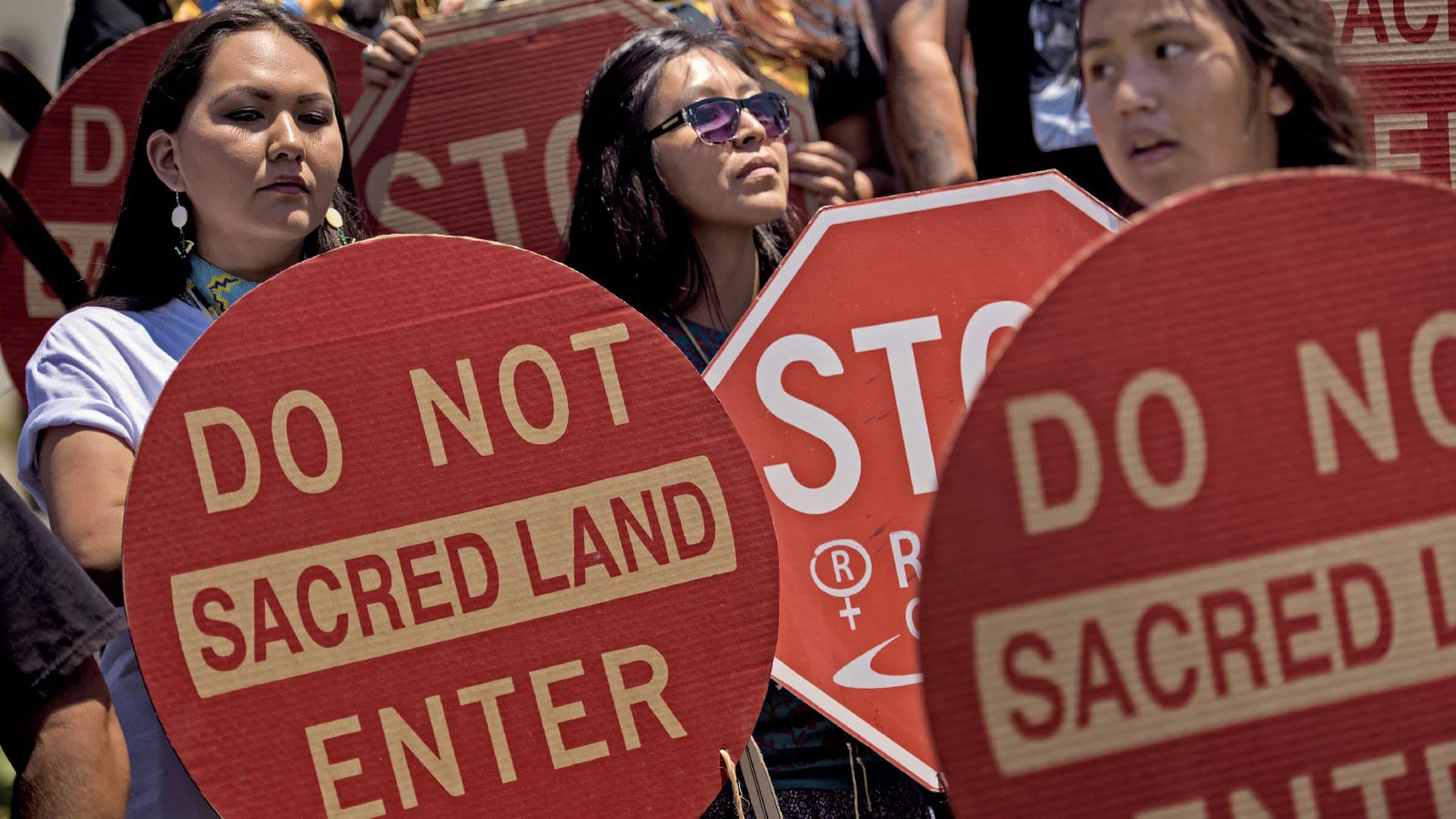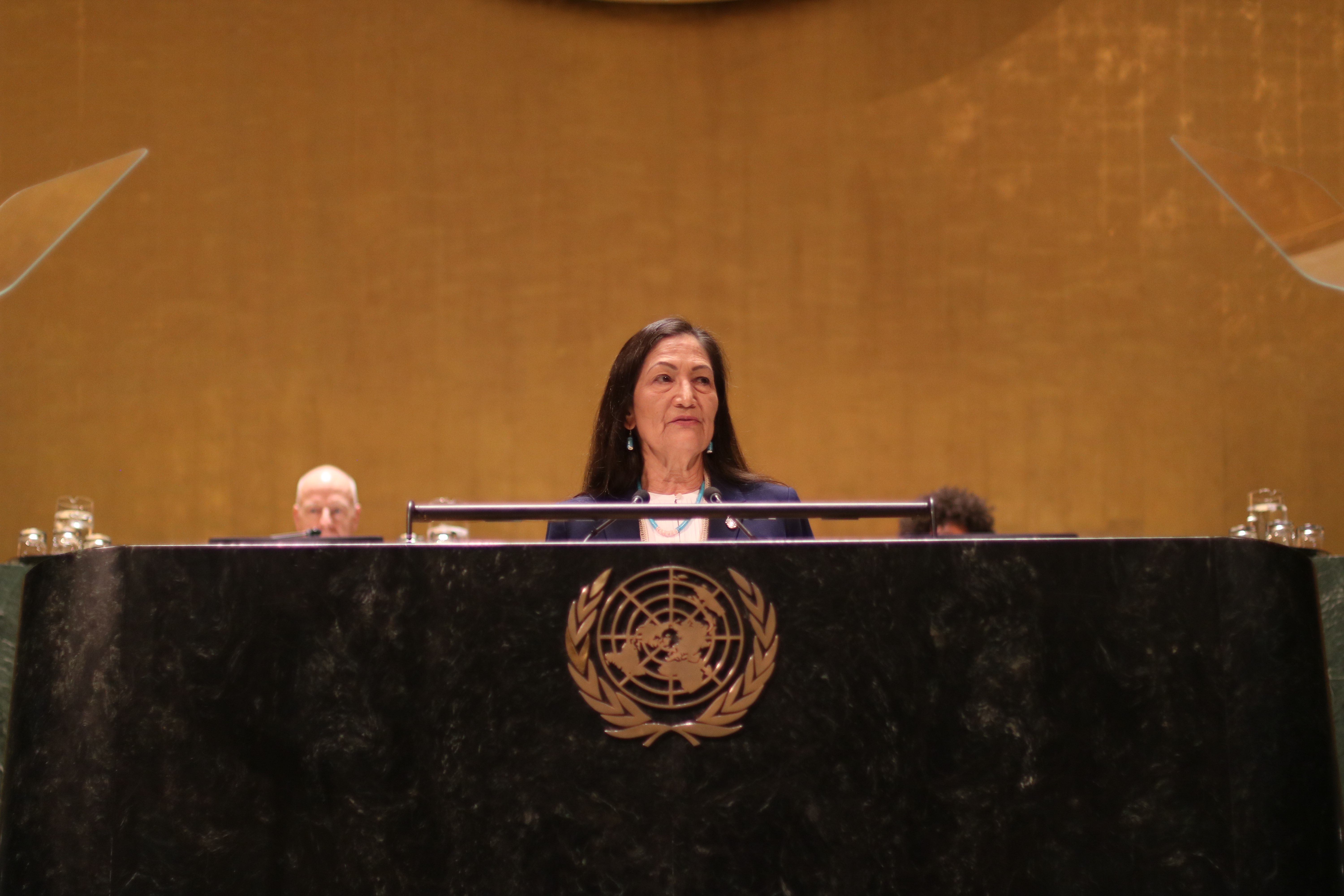
- Details
- By Kate Schimel, Grist
This story is published as part of the Global Indigenous Affairs Desk, an Indigenous-led collaboration between Grist, High Country News, ICT, Mongabay, and Native News Online.
The San Carlos Apache Tribe has taken its fight to the United Nations to save its traditional territory in Arizona from a massive copper mine. Chi’chil Bildagoteel, also known as Oak Flat, is home to one of the largest sources of copper in North America, and it is also the tribe’s most sacred site. San Carlos Apache Tribe Chairman Terry Rambler told the U.N. that the destruction of sacred sites is a “major human rights violation,” although he stopped short of describing the plans to mine Oak Flat in those specific terms.
“Oak Flat is a holy site, an area of irreplaceable beauty akin to a church, no different than the Wailing Wall, Temple Mount, Australia’s Juunkan Gorge or Mecca’s Kaaba,” Rambler said in an statement also called an “intervention” before the United Nations Permanent Forum on Indigenous Issues, or UNPFII. “By violating the rights of Apaches to practice our religion and maintain our spiritual health and wellbeing, the United States is failing to comply with international standards incumbent on them as signatories of treaties and declarations that protect these fundamental human rights.”
Rambler urged the forum to call on the U.S. and other member states to protect sacred sites and asked forum leaders to visit the area to better understand its significance.
In 2014, Congress approved a defense bill that included a rider transferring the vast plateau of knobby rocks, desert vegetation and watery oases east of Phoenix to the owners of the Resolution Copper Mine. Apache leaders protested, along with nearby communities, conservationists and retired miners. In spite of all the objections, then-President Barack Obama signed the bill into law, moving the land transfer forward.
In 2021, the Biden administration halted the project, withdrawing the environmental impact statement and restarting the tribal consultation process. But the reprieve did not last: Federal officials have since moved ahead, arguing in court that the land swap should proceed despite Indigenous and environmental objections.
Last month, the 9th Circuit Court heard arguments on a case brought by Apache Stronghold, a coalition of Apaches and their allies. The case hinges on the question of whether destruction of the site violates the religious rights of the Apache.
The two international mining companies behind the proposal to mine Oak Flat have drawn previous scrutiny for infringing on Indigenous rights and destroying significant sites. One of them, Rio Tinto, is responsible for the destruction of 46,000-year-old rock shelters in Juunkan Gorge in Western Australia, a move that sparked an enormous backlash and resulted in the resignation of the chairman as well as other high-ranking officials. Resolution Copper representatives did not respond to requests for comment on this story by press time.
The mine could produce up to 40 billion pounds of copper over 40 years, and operators say it would provide approximately 1,500 jobs and millions in tax revenue and compensation. The copper extracted from Oak Flat could be used in renewable energy development, as well as electronics and essential infrastructure. Still, earlier this month, in a letter to the head of the U.S. Department of Agriculture, Arizona Rep. Raúl Grijalva criticized the project for sacrificing Indigenous freedom in order to produce copper for the global market.

At the United Nations last week, Biden administration delegates focused instead on their Indigenous rights bona fides. Interior Secretary Deb Haaland said the administration was finding ways to implement the U.N. Declaration on the Rights of Indigenous Peoples across the entire federal system. “The United States is leveraging an essential — yet globally underutilized — tool to address our interlocking climate and biodiversity crises: Indigenous knowledge,” said Haaland. “Through it, we are creating new opportunities for the original stewards of our nation, and for our department.”
Indigenous peoples in the U.S., however, say that the administration has backed significant infringements on their rights. That includes pushing forward the Willow Project, ConocoPhillips’s plans to drill for oil in a remote part of Alaska, over the objections of the local Alaska Native community. But Haaland pointed to the establishment of Avi Kwa Ame National Monument and salmon restoration efforts as evidence of the administration’s commitment to Indigenous rights.
At the forum, Indigenous communities across the globe drew attention to the burden green energy development places on Indigenous communities. In Norway, for example, Indigenous Sámi activists argued that an illegal wind farm that infringes on Sámi grazing areas represents a violation of their human rights, a position the Norwegian Supreme court upheld. In the U.S., the Yakama Nation has objected to a pumped hydro project that could destroy a treaty-protected area for gathering first foods. In Canada, land defenders from Wet’suwet’en have fought a pipeline across their unceded lands, calling it a violation of international law and of their rights and requesting that international observers from the UNPFII visit and condemn the government’s actions.
On April 26, Rambler will join tribal leaders and supporters in front of the White House to protest the mine and ask the Biden administration to recognize Indigenous communities’ rights to the land. In court hearings, the federal government indicated that it would move ahead with releasing the environmental impact statements that would allow the mine to proceed. Both sides await a ruling from the 9th Circuit Court.
“Indigenous peoples’ spiritual well-being and relationship with the environment must be protected as a matter of health,” Rambler said.
This article originally appeared in Grist at https://grist.org/article/san-carlos-apache-take-copper-mine-fight-to-united-nations/.
Grist is a nonprofit, independent media organization dedicated to telling stories of climate solutions and a just future. Learn more at Grist.org
Help us defend tribal sovereignty.
At Native News Online, our mission is rooted in telling the stories that strengthen sovereignty and uplift Indigenous voices — not just at year’s end, but every single day.
Because of your generosity last year, we were able to keep our reporters on the ground in tribal communities, at national gatherings and in the halls of Congress — covering the issues that matter most to Indian Country: sovereignty, culture, education, health and economic opportunity.
That support sustained us through a tough year in 2025. Now, as we look to the year ahead, we need your help right now to ensure warrior journalism remains strong — reporting that defends tribal sovereignty, amplifies Native truth, and holds power accountable.
 The stakes couldn't be higher. Your support keeps Native voices heard, Native stories told and Native sovereignty defended.
The stakes couldn't be higher. Your support keeps Native voices heard, Native stories told and Native sovereignty defended.
Stand with Warrior Journalism today.
Levi Rickert (Potawatomi), Editor & Publisher

